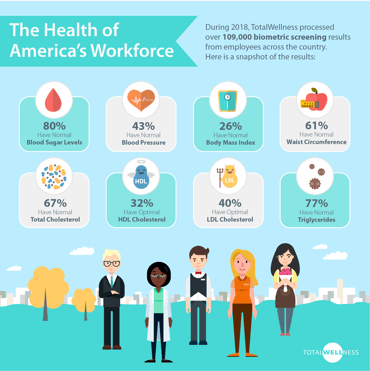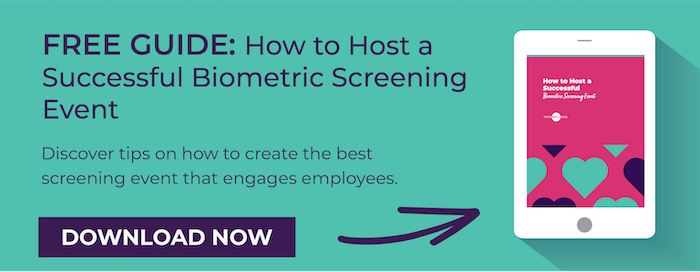 Each year, TotalWellness collects extensive data to better understand the health status of U.S. employees. In 2018 alone, we conducted over 100,000 biometric screenings across workplaces in the United States.
Each year, TotalWellness collects extensive data to better understand the health status of U.S. employees. In 2018 alone, we conducted over 100,000 biometric screenings across workplaces in the United States.
Our biometric screenings consist of a variety of health measures including:
- Cholesterol
- Blood sugar
- Body Mass Index (BMI)
- Blood pressure
- Waist circumference
These screenings offer pertinent insight to the well-being and health of employees — both men and women. From C-suite leadership to blue and white collar workers, we’ve screened everyone in-between to get a thorough idea of employee wellness. Once the results are finalized, we share a report with each company’s wellness team to better support employees through wellness programming.
Now, we want to share the nationwide results with you.
What the Numbers Say About Employee Health
TotalWellness provides aggregate reports of each company’s biometric health screenings. This makes it easier to look at the big picture of employee health in one snapshot.
Here’s the results of our data collection from 2018:
Cholesterol
Cholesterol is a type of fat-like substance that’s found in the blood. It can come both from our bodies and from the food we eat.
Why it Matters
Your employees’ cholesterol can be affected by their bodies and their diets. Consuming meat, poultry, and full-fat dairy products can impact cholesterol levels. High cholesterol can lead to issues like heart attack or stroke.
What Our Research Found
Of our participants, 67% have normal total cholesterol. Total blood cholesterol is a measure of all the cholesterol components.
TC/HDL Ratio
- 50% have optimal TC/HDL Cholesterol
HDL Cholesterol (“Good” Cholesterol)
- 32% have optimal HDL Cholesterol
- 47% have near optimal HDL Cholesterol
- 21% had low (high risk) HDL Cholesterol
LDL Cholesterol (“Bad” Cholesterol)
- 40% have optimal LDL Cholesterol
- 18% have borderline high LDL Cholesterol
- 1% had very high LDL Cholesterol
According to the Cleveland Clinic, anyone over 20 years old should get cholesterol levels measured at least once every 5 years.
Glucose
A blood glucose test measures your employees’ blood sugar levels. Blood sugar AKA glucose, is the main source of energy that our bodies use. It comes from the foods we eat, and is then carried to cells through the bloodstream.
Why it Matters
Blood glucose is often used as an indicator of a person’s potential diabetes risk. These screenings are used to evaluate diabetes risk, but abnormal results can also indicate a variety of other health issues. Left untreated, high blood sugar can damage your employees’ eyes, kidneys, nerves, heart and blood vessels.
What Our Research Found
Of our participants, most have normal glucose levels.
- 80% participants have normal blood glucose
- 16% are prediabetic
- 4% have diabetes
Blood Pressure
Blood pressure refers to the pressure of blood against the inside walls of blood vessels. These blood vessels carry important nutrients, like oxygen, to all parts of our bodies.
Why it Matters
All of our tissues and organs need proper oxygenated blood. This pressure is responsible for pushing the nutrient-rich blood through veins, capillaries, and arteries. If blood pressure is too high or too low, it can cause harm by making the heart and blood vessels work overtime. This can lead to cardiovascular issues. Employees should know their baseline normal blood pressure so they can identify lifestyle factors that may increase it.
What Our Research Found
Of our participants, 43% have normal blood pressure.
- 14% had elevated blood pressure levels
- 32% Stage 1 hypertension
- 11% had Stage 2 hypertension
- 0% were in hypertensive crisis
Body Mass Index (BMI)
BMI is a number calculated from your employees’ heights and weights in order to identify potential body weight concerns. It’s important they know their BMI since weight can indicate current and potential health problems.
Why it Matters
BMI is considered a reliable indicator of obesity. Health issues like diabetes or heart disease risk factors increase tremendously once BMIs rise above 21. A collection of research from Harvard’s School of Public Health reports adults who gained 22 pounds or more have a higher risk of developing chronic diseases.
What Our Research Found
Of our participants, only 26% have a normal body mass index.
- 33% of participants were overweight
- 21% had a high weight
- 11% had a very high weight
- 8% had an extremely high weight (40+ pounds)
Waist Circumference
Along with measuring BMI, waist circumference is another useful measure for checking obesity risk. When most of an employee’s fat is around the waist and not the hips, it increases the risk of type 2 diabetes and heart disease.
Why it Matters
As waistlines expand, so does the risk of health issues like being overweight or having obesity-related diseases. Larger waistlines mean an increase risk of high blood glucose, high triglycerides, physical inactivity, and high blood pressure.
What Our Research Found
Of our participants, 61% have a normal waistline circumference. 39% had a high waist circumference (men measuring at 41+ inches and women at 36+ inches).
Benefits of Biometric Health Screenings
Biometric health screenings benefit everybody at the workplace, including remote employees. And when you consider the results, you can see how this information can truly help steer wellness initiatives in the workplace. A few more benefits of biometric health screenings:
- Immediate results: Your employees can see immediately where their health stands when you host an onsite biometric screening day. This let’s them start making necessary follow-up appointments and health adjustments right away.
- Onsite time saver: Save employees a trip to the doctor by providing qualified healthcare professionals at the worksite to run critical screening tests.
- Provides health baseline: Knowledge truly is power. When employees know more details about their health, they can make proper changes to their lifestyle.
- Assists in wellness program planning: When you have a better idea of where your employees are struggling with health, it makes it easier to create targeted health campaigns toward those health issues.
From beginning to end, our team guides you through the process of biometric screenings. It’s a great way to encourage employees to take a hard look at their health, as well as help employers establish a stronger wellness culture.
Just as every person is different, so is every worksite. Here at TotalWellness, we customize screening events to you and your workforce to ensure the best results.
Want to learn more about biometric screenings? You can find more details on our biometric screening information page.



